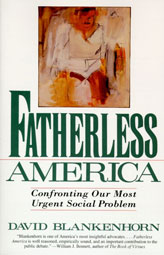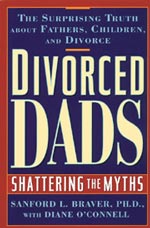Fatherlessness- Families
![]()
Lunacy 101: Questioning the Need for Fathers
Jewish World Review, By Dr. Wade F. Horn, July 7, 1999 / 23 Tamuz, 5759
JUST WHEN I THOUGHT it was safe to admit I am a psychologist, the American Psychological Association (APA) goes and does something nutty yet again.
Last year the APA published a study advocating that the term child sexual abuse be replaced, at least in some cases, with adult-child sex, a more "value neutral term." Fortunately, after several months of defending the publication of that study, the APA came to its senses and acknowledged that its not in the best interests of children to define pedophilia down (boy, now theres courage for you!).
No sooner had I completed my mental victory dance in celebration of this return to sanity within the APA, then what should appear on my desk but the June 1999 issue of the American Psychologist. Now, the American Psychologist is no obscure journal; in fact, it is the only APA journal sent to every member of the American Psychological Association. It is used routinely to espouse the viewpoint of the APA leadership.
So what was so upsetting about this issue of the American Psychologist? In its infinite wisdom, the APA decided to publish as its lead article, a broadside against the fatherhood movementjust in time for Fathers Day. They should have just sent a tie.
Titled "Deconstructing the Essential Father" and penned by Louise B. Silverstein and Carl F. Auerbach, both of Yeshiva University, the authors of the article make two arguments: First, fathers are really non-essential to the healthy development of children. Second, marriage stinks.
The authors begin their first argument by stating that their "research experience has led us to conceptualize fathering in a way that is very different from the neoconservative [Read: anyone who thinks fathers matter] perspective." And what is their vast research experience? Over the past six years they have studied the fathering experience of 200 -- yes, a whole 200! -- men. Now theres a representative, national sample for you!
While acknowledging that "the presence of a father may have positive effects on the well-being of boys," two paragraphs later the authors come to the stunning conclusion that "...the empirical literature does not support the idea that fathers make a unique and essential contribution to child development."
There you go! Dads you dont make a difference! So dont worry about rushing home to play ball with your kid in the backyard, you wont be missed. According to these two psychologists, all that is simply non-essential!
What the authors apparently missed, of course, is two decades of research attesting to the impact of father absence on the well-being of children, including increased risk for school failure, emotional and behavioral problems, juvenile crime, and teenage pregnancy.
But you dont have to take my word for it. How about the word of Cornell University professor Urie Bronfenbrenner, one of the most eminent developmental psychologists of our time, who wrote:
"Controlling for factors such as low income, children growing up in [father absent] households are at a greater risk for experiencing a variety of behavioral and educational problems, including extremes of hyperactivity and withdrawal; lack of attentiveness in the classroom; difficulty in deferring gratification; impaired academic achievement; school misbehavior; absenteeism; dropping out; involvement in socially alienated peer groups, and the so-called teenage syndrome of behaviors that tend to hang togethersmoking, drinking, early and frequent sexual experience, and in the Read More ..treme cases, drugs, suicide, vandalism, violence, and criminal acts." Ah, that Dr. Bronfenbrenner, he must be some kinda right wing nutcase.
But the authors of this diatribe against the fatherhood movement are not content to merely toss fatherhood into the trash can of irrelevancy, No, not by a long shot. The authors go on to suggest that fathers are actually downright dangerous.
The authors warn, for example, of "the potential costs of father presence," and especially their propensity to fritter away family resources on "gambling, purchasing alcohol, cigarettes, or other nonessential commodities" thereby "actually increasing womens workload and stress level."
The real target, however, is not fathers, but marriage. In an extraordinary section criticizing the idea that marriage matters, the authors assert that they can not find "any empirical support that marriage enhances fathering or that marriage civilizes men and protects children."
Really? No evidence whatsoever? So all those studies showing that married fathers, on average, spend Read More ..me with their children than unmarried fathers are simply a figment of the collective imagination of time-use researchers. And I guess the two decades of research showing that marriage leads to mens lower use of alcohol and drugs and greater work effort is mere fabrication. And, of course, the hundreds, if not thousands, of studies showing that children fare best in two-parent married households was simply made up by those nasty old "neoconservatives."
In fact, the authors make the stunning assertion that the decline of marriage has actually been a good thing because studies show a decline in the number of women murdered by their intimate partners between 1976 and 1996. Note the use of the word partners, not husbands. And, of course, no mention is made of the fact that child abuse rates have tripled in that same time period, but I quibble.
The article then goes on to argue that divorce is not really all that bad for children. As evidence, they cite the work of Paul Amato of the University of Nebraska who has reported that "...although children from low-conflict marriages are negatively effected by divorce, the adjustment of children in high-conflict marriages actually improves after divorce."
What these authors leave out, however, is that Paul Amato estimates that only about 30% of all divorces in America are the result of high-conflict marriages. Indeed, rather than a defense of divorce, Paul Amato concludes that in the large majority of cases of divorce, it is better for the children for the parents to stay married. It doesn't seem to bother these authors that they neglect to mention Paul Amatos actual conclusion.
The point of all this silliness is to advocate against providing any funding for programs that support fathers or marriage. Indeed, the authors assert that any attempt to use government resources in this way is, by definition, discriminates against mothers and "alternative family forms."
Exactly why spending billions of dollars to support father absent and non-married households is not discrimination against fathers and marriage, these enlightened psychologists don't say.
So there you have it. Dads don't matter. In fact, they are downright dangerous. And the only thing marriage does is promote domestic violence against women. Why? Because these two psychologists say so, thats why. After all, they have studied 200 fathers!
So here's my question for you, dear readers: Should I continue my membership in the APA so that I can keep on eye on what they are up to, or should I resign out of protest for their publishing this kind of junk science?





